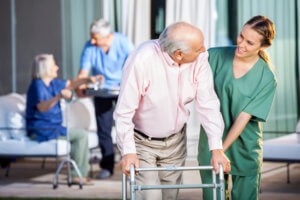Signs of Nursing Home Elder Care Abuse and Neglect and What To Do About It
 It is troubling to think that the topic of elder care abuse and neglect in nursing homes is one we have to discuss, but, unfortunately, it is an issue that can adversely affect the older, and more vulnerable, people in our lives. Due to the nature of nursing homes, sometimes signs of abuse, or cries for help, are dismissed as indicators of old age or dementia. It is important to be cognizant of elder care signs of abuse and neglect to ensure the best care of our loved ones in their later years.
It is troubling to think that the topic of elder care abuse and neglect in nursing homes is one we have to discuss, but, unfortunately, it is an issue that can adversely affect the older, and more vulnerable, people in our lives. Due to the nature of nursing homes, sometimes signs of abuse, or cries for help, are dismissed as indicators of old age or dementia. It is important to be cognizant of elder care signs of abuse and neglect to ensure the best care of our loved ones in their later years.
The first thing to be aware of are the types of nursing home abuse that can occur. According to the National Center on Elder Abuse (NCEA), each type of abuse causes different types of symptoms that can indicate abuse:
If you do discover that an elderly person has experienced abuse or neglect under a nursing home’s care, there are some specific things you need to do:
- Verify the elderly person’s story. Your first step should be to see if the elderly person is telling the truth. Get clear about what your relative or friend is saying by going over the problem with them. If you can, check with other residents of the nursing home who seem to be coherent. Also, gather medical records, or take photos, of recent injuries or prescriptions.
- Consider removing the elderly person to another facility. If you are worried about the safety of a nursing home resident, assist them in leaving the nursing home immediately.
- Inform the authorities. Inform the police or district attorney. In some states, such as California, you are required to report elder abuse when you learn it has occurred. If the district attorney determines that the evidence that you present rises to the level of criminal behavior, the state will file charges against the nursing home.
- File a complaint with the appropriate agencies. File a complaint about the nursing home to your state’s department of social services, adult protective services, or elder protective services.
- Consider hiring an attorney. You should retain a civil attorney experienced in one or more of the following areas: nursing home law, elder abuse, personal injury, or consumer fraud. In certain situations, it is possible to join with other persons who have suffered damages as a part of a class action lawsuit.
If you or someone you know has suffered abuse or neglect while at a nursing home, the law offices of Martin Harding & Mazzotti, LLP can help. Call us at 1-800-LAW-1010 or click here to learn more.
 It is troubling to think that the topic of elder care abuse and
It is troubling to think that the topic of elder care abuse and